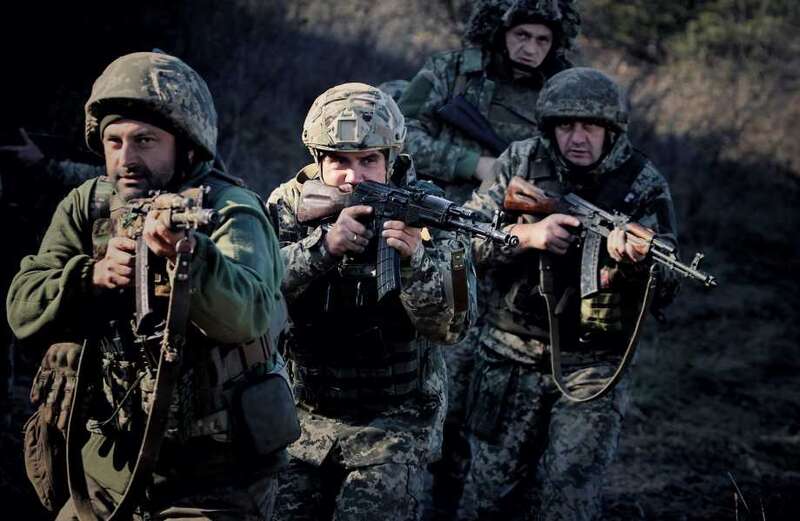UKRAINE is in the worst position it has been in since it staved off the Russian invasion last year.
This year’s counter-offensive gained very little ground at vast cost in both military casualties and munitions, and has now stalled with winter firmly set in.

With inadequate air, artillery and engineering assets, the Ukrainian army was unable to break through strongly constructed Russian defences which had been built up at the same time as the Ukrainians prepared to penetrate them.
Having seen it first hand on the front lines, I can’t fault Ukrainian military prowess.
But the resolve of Western countries to give them the tools they need to finish the job has been sorely lacking.
 From tongue scraping to saying no, here are 12 health trends to try in 2023
From tongue scraping to saying no, here are 12 health trends to try in 2023
Heel-dragging is an understatement.
You will remember at the beginning of the conflict how Germany — the powerhouse of Europe — refused to donate the military equipment Ukraine so desperately needed, sending only helmets and medical kits.
‘Running scared’
Then, for a long time, they even blocked other countries from donating German-made tanks.
US President Joe Biden talked big but didn’t deliver anywhere near enough.
Like the Western Europeans, he was deterred by fear of Russia’s so-called red lines.
That meant stalling time and again on sending combat planes which, although they have now been promised, are nowhere in sight.
It also meant, for a long time, the refusal to send tanks or long-range missiles.
Those munitions that were sent by the US and other countries were subjected to severe limitations on their use.
That included the condition they couldn’t be used against sovereign Russian territory, where they could have inflicted damage that might have been game-changing.
But Western leaders were running scared of Russian retaliation.
 How to de-clutter if you have a beauty stash to last you a lifetime
How to de-clutter if you have a beauty stash to last you a lifetime
Under Boris Johnson, a more bullish Britain helped unlock some of this paralysis by sending key weapons such as tanks and long-range missiles.
That was all done on a relatively small scale but forced others, including the Americans, to eventually follow suit.
Only Eastern European countries, such as Poland and the Baltic states — themselves hard up against the Russian menace — gave pretty much all they had.
Now some of that is running into the buffers.
Slovakia was a staunch supporter of Ukraine from the start, but last week the new government there, with a pro-Moscow platform, cancelled a plan to send rockets, artillery shells and bullets to Kyiv and has called for peace talks and the lifting of sanctions against Russia.
Slovakia ending military aid is a set-back, not a game-changer.
But its new political stance will add fire to a growing row in the EU over Ukrainian membership talks as well as both financial support and military aid.
These issues are supposed to get thrashed out at an EU heads of government meeting on Thursday.
Hungary, whose prime minister Viktor Orban is aligned with Russia, opposes all of them, and it is likely Slovakia will do the same.
Ukrainian President Volodymyr Zelensky buttonholed Orban yesterday at the inauguration of the new Argentinian president, and strong words seem to have been exchanged.

But there are no signs that Hungary’s position is likely to change.
Membership talks and funding require all EU nations to agree so, unless compromise is reached, Ukraine will be in trouble.
Financial and military aid from the EU are critical, especially with deadlock in Washington over Biden’s latest assistance package.
The White House’s plan to send another $61billion dollars in aid has been blocked by Republicans in the Senate.
Zelensky will be in Washington tomorrow and will appeal to both houses of Congress during his visit.
Given the reasons behind the blockage, it is hard to see how that can make any difference.
Those who reject the Bill point to a lack of coherence in Biden’s strategic vision for victory.
They are also critical of the administration’s sanctions against Moscow, which they consider inadequate, allowing Russia to significantly expand its defence economy since the war began.
And they have linked the aid package to concerns over US border security, which is one of the highest priorities among Republican lawmakers.
All this is devastating for Ukraine’s war effort at the worst possible time, with the Russians already on the attack at many points of the front line and likely preparing for a major offensive early next year.
‘Robbed of credibility’
To stem that potential assault, and stand any chance of returning to the offensive, Ukraine does not need back-sliding amongst its allies.
It needs large numbers of long-range missiles plus tanks, fighter jets and artillery shells.
But we are more likely to see greater equivocation in the capitals of Europe and the US, with war-weariness already set in and attention shifted from Ukraine to the conflict in Gaza.
And there are indications that Biden will try to bring about an agreement between Russia and Ukraine before the US elections next year so he can paint himself as a peacemaker.
European leaders, at least in the West, will go along with him.
The problem is that it can only involve Russia hanging on to the territory it has already seized.
If that were to occur, not only will it be a defeat for Ukraine, it will also be a defeat for Nato.
It would rob the alliance of any remaining credibility following the debacle in Afghanistan two years ago.
































